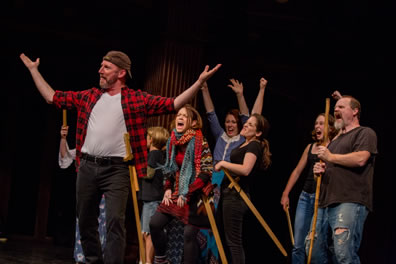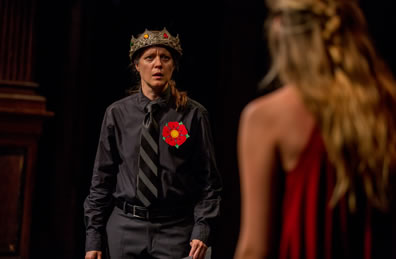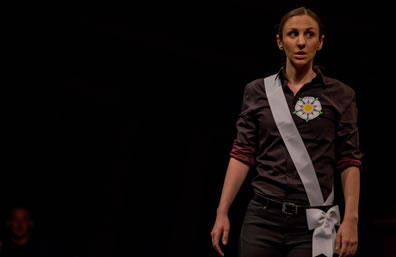Henry VI, Part 2
Bootleg Shakespeare's Timely Undertow
Taffety Punk Theatre Company's Bootleg Shakespeare, Folger Theatre, Washington, D.C.
Monday, July 24, 2017, E–2&4 (center stalls)
Directed by Marcus Kyd

Jack Cade (Dan Crane, left) fires up his base as he leads a peasant rebellion against the noble class of the realm in Taffety Punk's Bootleg Shakespeare production of William Shakespeare's Henry VI, Part 2, at the Folger Theatre. Photo by Brittany Diliberto, Taffety Punk Theatre Company.
In its annual exercise of theatrical derring-do—mounting a full-scale William Shakespeare play in one day for a one-night-only performance in the Folger Theatre—Taffety Punk amps up the challenge of its Bootleg Shakespeare productions by selecting the playwright's more obscure works. Last year it was Henry VI, Part 1, which means that Henry VI, Part 2, lined up for this year's 11th Annual Bootleg Shakespeare.
Oh, but what a difference a year has made for the nation. Suddenly, a singular feature of Henry VI, Part 2, the Jack Cade Rebellion, reverberates with shuddering relevancy, potentially lifting this play out of its relative obscurity. Over the next three or so years, the Henry VI plays, and this installment in particular, might get as many mountings or more as, say, Julius Caesar, Coriolanus, or Richard III thanks to Jack Cade.
Not that Taffety Punk was concerned with such conceptual context. Bootleg Shakespeare is all about survival. The cast—numbering 32 actors this year and comprising many of Taffety Punk's company members as well as leading talent from other companies in the Washington, D.C., region—shows up at 10 a.m., off-book but otherwise completely fresh to the production they are about to perform to a full house in a little over nine hours. Some actors haven't even met one another before that morning. Plus, as there's no time for special effects beyond music (Josh Taylor) and simple lighting (Chris Curtis), the productions resort to devil-may-care staging, like a parrot puppet on an attendant's arm serving as a falcon, the witch Margery Jourdain (Liz Daingerfield) dancing Nijinsky-like while conjuring spirits to a cheesy soundtrack, and Alexander Iden (Maboud Ebrahimzadeh), the esquire who slays Jack Cade, presenting the rebel's head to the king and still carrying it as he finds himself fighting in the quickly escalating War of the Roses' first battle.
Nevertheless, the time constraint, the talent (many of the actors are Shakespearean veterans), and the throw-caution-to-the-wind attitude under the sure-handed direction of Taffety Punk Artistic Director Marcus Kyd results in some of the best staged Shakespeare we see in any given year. Don't let Kyd's preshow self-deprecating speech fool you—"We skipped scenes to get to the fights so we can die," he tells the audience: These Bootleg Shakespeare productions have a near-miraculous sense of unity and comprehensive vision for being mounted in one day.
This production, however, did have one conceptual element Kyd had to contend with: the play is the second of four installments. “The afterlife of this story is a new thing for us,” Kyd says in a press release for the production. “Actors are returning to play the same roles. A lot of the characters who don’t die in this play come back in the next plays. We’re having to think ahead in a way we never did before. We have to protect the arc of this play, while also telling the larger arc of the tetralogy: Henry VI, Parts 1 and 2, are essentially setups for Part 3, which is a setup for Richard III.”
During his preshow speech, Kyd brings the entire cast onto the stage for a tribute to their courage. He then slides from his housekeeping announcements into a recap of Part 1 as the cast behind him acts out the synopsis in dumb show. One key actor is missing: Tonya Beckman, who played Margaret and "et al." in Part 1. Madeline Burrows takes over the part of now-Queen Margaret, but while Beckman, a Bootleg mainstay from the beginning, is not in the cast list, she yet makes an appearance in this installment. Midway through the play, as York (Teresa Spencer) argues for his right to the throne with a complex genealogy lesson, Spencer's visual aid is members of the ensemble carrying signs identifying themselves as ancestors and other kin acting out yet another dumb show (some being their characters in these plays, such as Esther Williamson as King Henry). A portrait of Beckman serves as the representation of York's mother. It's an inside joke, but the whole scene makes for a wonderful Shakespearean joke, too: PowerPoint graphics, let alone miming actors, can untangle this genealogical argument, but after York's spiel and a slight pause, the Earl of Warwick (Jamie Beaman) turns to the audience and says, "What plain proceeding is more plain than this?" earning hearty applause.
One-day-to-stage means a modern-dress setting, naturally, and the nobles wear red or white badges on their lapels depending on their allegiance to either the House of York or the House of Lancaster, respectively. Still, clothes choices have thematic implications (Scott Hammar is credited with costumes). Daniel Flint returns as the duplicitous Cardinal of Winchester in his red trench coat with a white cross painted on the back. In the St. Albans falconry scene, he’s wearing a red velvet jogging suit and red tie, and at his death he’s in red satin pajamas and a red robe as he scatters money about in his sin-induced anguish watching the gates of hell opening for him.
Todd Scofield, reprising his role from Part 1 as Humphrey, the Duke of Gloucester and Henry's Lord Regent, in his dark suit and light blue tie, focuses his performance on the frequently used tag "the good Duke Humphrey." He bears a serious demeanor in his approach to government, his response to the attacks of his enemies in court, and his reaction to the shenanigans of his wife, Eleanor, played by Kimberly Gilbert. Wearing a flower print jumpsuit, matching high heels, silver necklace, silver hoop earrings, bracelets on both wrists, and multiple rings, Gilbert, who turned in a delicious Joan of Arc in Part 1, makes Eleanor the sexy socialite of the cocktail party circuit. "Were I a man, a duke, and next of blood, I would remove these tedious stumbling-blocks and smooth my way upon their headless necks," she says, Gilbert delivering Shakespeare's punning acumen to its full force.
Because she can't nudge her husband to be king instead of merely wielding the powers of a king as Lord Regent, she resorts to sorcery, enlisting a double-dealing priest, Sir John Hume (Ebrahimzadeh) to hire Margery Jourdain and her colleagues in black magic. In a rare bit of textual interpolation for a Bootleg production, Hume is on stage with Eleanor's first appearance in the play's second scene rather than entering when she calls to him later in the scene. The two are engaging in heavy petting, breaking off when Gloucester enters, and Hume never leaves the stage but eavesdrops until Gloucester exits. This interpretation is likely gleaned from Eleanor's comment when she (in the text) first calls for Hume: "Nay, fear not, man, we are alone: here's none but thee and I." Ebrahimzadeh's Hume emerges from his hiding place and they resume their affair as they discuss the coming séance.
Gilbert is an entertaining actress, but she also reveals the deepest roots of her characters. After her arrest, Eleanor is ordered to do public penance, and Gilbert enters carrying large desk candles in each hand and wearing a white bed sheet on which is pinned signs with "Haughty," "Traitor," "Usurper," "Snob," "Hag," and "Vile Woman" (in the text she describes having "papers on my back"). This specter inspires laughter, but Gilbert then takes us into the very heart of this proud woman and her humiliation, her anger that her husband never appreciated her ambition for him, and her fear that his enemies will prevail. "My shame will not be shifted with my sheet," she says: "No, it will hang about my richest robes and show itself, attire me how I can."
As for Eleanor's chief rival, Queen Margaret, one of Shakespeare's greatest character creations, Burrows portrays a privileged pouter, dressed in an orange-laced punk poodle skirt, leather flight jacket, boots, and a shaggy tangle of big hair. The petulance fits her early scenes, but it undermines the emotional oomph that comes when her lover, Suffolk (Chris Genebach as a real man's man), is banished and, later, when she's caressing Suffolk's severed head in the court. This is, perhaps, a product of producing the Henry VI tetralogy one play at a time (and in an extraordinarily short amount of time, at that), in which the mighty Margaret doesn't manifest fully until Part 3.
Although Kyd and company use the circumstances of these Bootleg productions as an excuse for much lighthearted fun, a fundamental respect for Shakespeare's texts guides the staging. I've often seen the St. Albans scene truncated, but Kyd leaves it intact, thus tapping the play's emotional core. The scene is a prototype of the serious-to-slapstick-to-tragic sequencing Shakespeare would later perfect, starting with Humphrey and Winchester sniping at each other, leading to a promised duel—which comes off as a playground confrontation culminating in a "meet me after school" challenge. This discord is interrupted by shouts of "A miracle, a miracle!" as a man named Simcox is reported cured of his lifelong blindness at St. Albans shrine. Simcox, who is yet lame, and his wife come before the king, where Humphrey exposes their scam. Under threat of whipping, they run off with the townsfolk crying out about a second miracle now that the lame man can walk, too. The passage is intended to put Gloucester's wisdom on display, but it's also slapstick buffoonery, which is how the Bootleg company plays it. Then, immediately upon the Simcoxes running off, the Duke of Buckingham (James Flanagan, a cool politician with his sunglasses) enters with news of the Duchess of Gloucester's arrest for engaging in witchcraft and treason. The sudden shift to a somber tone reverberates across the stage as Gloucester's inevitable downfall (and eventual murder, the subtitle of this play) overtakes the silly business of the Simcoxes. It mirrors the play's larger structure, as open warfare will end up overtaking the political pettiness of the court.
At the center of that court is Henry. Being the son of the famous warrior Henry V constantly tugs at Williamson's performance of a young man ordained to rule but hindered by his inexperience with governance, personalities, and, apparently, sex. His excessive piety enables his naiveté. As Williamson plays him, Henry is not clueless—he clearly sees the discord around him and his wife's affair with the Duke of Suffolk (but doesn't banish Suffolk until he is linked to Gloucester's death). However, he chooses to function in an alternate reality, that of a royal court which proclaims itself to be a Christian kingdom rather than a political killing field where men and women are guided solely by their own ambitions. While this Henry has nothing of his father in him, Williamson in her performance echoes the historical record of what Henry VI inherited from both of his grandfathers, mental illness, which she reveals in his distracted mannerisms and his brain cramping in pressure situations.


Top, Henry VI (Esther Williamson) finds governance too challenging while, above, York (Teresa Spencer) keeps a keen eye out for his chance to seize the crown in Taffety Punk's Bootleg Shakespeare production of Shakespeare's Henry VI, Part 2, at the Folger Theatre. Photos by Brittany Diliberto, Taffety Punk Theatre Company.
In contrast, Spencer as the Duke of York picks up where she left off in Part 1, keeping his ambition bottled up (though others can see it fomenting) as she observes everybody else on stage, tabulating their comments and behaviors into his calculations. "Then, York, be still awhile, till time do serve: Watch thou, and wake when others be asleep," he says in his first soliloquy. However, Spencer gets downright giddy in York's soliloquy at the end of Act III, Scene 1, when court wrangling results in his assignment to quell a revolt in Ireland. "Well, nobles, well, 'tis politicly done, to send me packing with an host of men … 'Twas men I lack'd and you will give them me: I take it kindly; and yet be well assured you put sharp weapons in a madman's hands."
For all the singular characters and political maneuverings Shakespeare worked into Henry VI, Part 2, this play belongs most famously to Jack Cade and his peasant rebellion. One of Shakespeare's most oft-quoted lines—"The first thing we do, let's kill all the lawyers"—comes from the Cade Rebellion, and while these scenes are written as comedy and played here as such, the implications and consequences of a rebellion bent on advancing stupidity, in which being intellectual or tenured is considered a crime, strike too close to home.
Dan Crane, in red checked shirt unbuttoned over a white t-shirt and jeans with a backward baseball cap on his head and a wooden sword at his side, is devilishly straightforward as Cade, and though there is a cacophonous company about him, Crane doesn't go over the top with his portrayal. He simply delivers Cade's lines with acute relevancy:
- In order to gain legitimacy, "I will make myself a knight presently," he proclaims.
- He claims that his father is of royal birth. "That's false," a court official says, flatly. "Ay, there's the question," Cade replies. "But I say, 'tis true," and after describing how his father was stolen "by a beggar-woman" and "ignorant of his birth and parentage, became a bricklayer," Cade concludes with, "His son am I; deny it if you can," an invention (as he calls it himself) his followers unquestioningly buy into.
- "Burn all the records of the realm: my mouth shall be the parliament of England," he orders.
- "The proudest peer in the realm shall not wear a head on his shoulders, unless he pay me tribute," he decrees.
- "There shall not a maid be married, but she shall pay to me her maidenhead ere they have it," he declares leeringly.
- When Iden (whom Ebrahimzadeh plays as a wealthy scion with an entourage) kills Cade in fight, the rebel to his last breath refuses to acknowledge that someone bested him. "Famine and no other hath slain me," Cade says. "I, that never feared any, am vanquished by famine, not by valor."
Hearing these lines, some might consider Cade the play's real villain. But the man who would become one of Shakespeare's most infamous villains is, literally, lurking at the back of the stage during the first armed battle of the Wars of the Roses. It's York's son, Richard, smiling as he watches his father kill Lord Clifford (Patrick Kilpatrick) with a slick knife thrust (Matthew R. Wilson is fight choreographer). Richard then sneaks up on Somerset (Paul Reisman), who has just dispensed with three attackers, and slits his throat. "Sword, hold thy temper: heart, be wrathful still," Richard says. "Priests pray for enemies, but princes kill." Given that Gilbert is playing Richard here and Kyd is thinking ahead in staging these plays, however odd it sounds (albeit, merely a truth) we are looking forward to next year's Bootleg Shakespeare when this Richard is slated to kill Henry at his prayers, and two years hence when this Richard would become king, third of that name.
Let's just hope those scenes don't seem as timely as Cade's Rebellion does this year.
Eric Minton
September 6, 2017
Comment: e-mail editorial@shakespeareances.com
Start a discussion in the Bardroom



 Find additional Shakespeareances
Find additional Shakespeareances